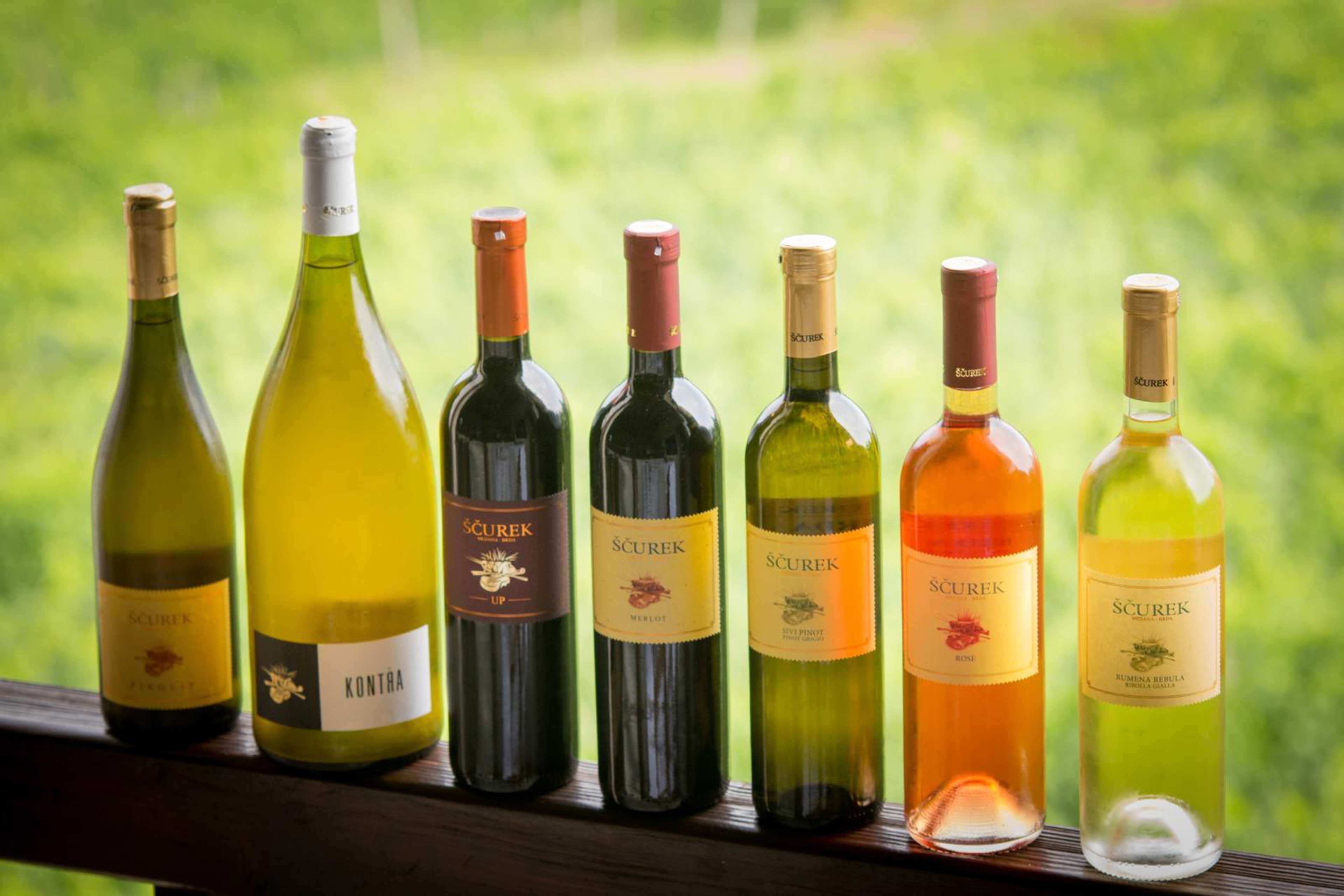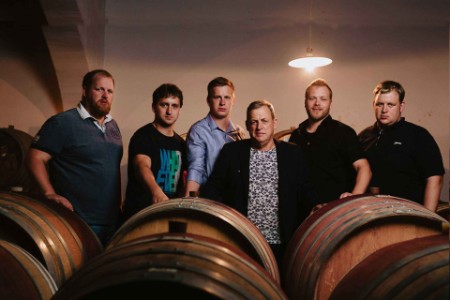Automatic bottling machine for wine, not milk
The first bottle of wine was produced in 1989. This was within the Brajda viticulture society, where local boys got together and brought the first automated bottling machine to Goriška Brda. To avoid paying for expensive licenses, they bought the machine on the pretext that it would be used to bottle milk. “Success came straight away, in the first year, and we were able to sell all the wine we produced. This gave us an enormous boost; however, not long afterwards, our success was halted by the war in the Balkans, which was one of our major markets. Well, this is how things are in business; crisis comes and throws you back to the beginning. At that time, we were also involved in grape production and we were able to continue with the sale of grapes,” remembers Stojan.
In the early 1990s they created their own brand, which has been retained in its original form up to today. “When you first penetrate the market, you operate within a group, until everyone has to fight for themselves. I have never tried to impose my wines on anyone. However, the market is relentless and sometimes you have to be somewhat pushy to secure a sale. Nevertheless, I do prefer doing promotion as part of socializing. We have a drink or two, and during the tasting of wines we get to know each other better,” says Stojan.

Everyone must be satisfied with what goes into the bottle
Occasionally, some of his peers used to comment that their wine was of poor quality: “That was something I couldn’t understand, since my father always maintained that ours was the very best,” Stojan adds with a smile. At the time, all types of grapes were used for making wine, regardless of the quality. Today, things are very different: “We are very critical. Everyone must be happy with what goes into the bottle.” Everyone includes his five sons, who are symbolically depicted on the label of the Strune wines, showing the image of a violin with five strings. They are all involved in the family business, each in his own role. “I started selling peaches at a very early stage, when I really didn’t understand money that well. Nevertheless, I was a six-year old kid “left” at Trojane to sell peaches. All I knew was exactly how much I had to charge for the peaches,” recalls Stojan, who is now responsible for sales to the Balkans and China, of his experience.
Occasionally, some of his peers used to comment that their wine was of poor quality: “That was something I couldn’t understand, since my father always maintained that ours was the very best,” Stojan adds with a smile. At the time, all types of grapes were used for making wine, regardless of the quality. Today, things are very different: “We are very critical. Everyone must be happy with what goes into the bottle.” Everyone includes his five sons, who are symbolically depicted on the label of the Strune wines, showing the image of a violin with five strings. They are all involved in the family business, each in his own role. “I started selling peaches at a very early stage, when I really didn’t understand money that well. Nevertheless, I was a six-year old kid “left” at Trojane to sell peaches. All I knew was exactly how much I had to charge for the peaches,” recalls Stojan, who is now responsible for sales to the Balkans and China, of his experience.
The oldest son, Primož, is in charge of the warehouse and welcomes guests to the farm. Tomaž is in charge of the cellar and wine, as well as marketing for the UK, Germany and Belgium. Uroš cares for the vineyards and is very keen on using the latest equipment and machinery. He is also responsible for the organization of work. Nejc, a student of economy, is very helpful in promotional activities and through his studies, he brings new approaches to storage and distribution to the family business. Then there is Matjaž, Bachelor of Science in Viticulture and Enology, who used his newly-acquired knowledge to introduce modern techniques of viticulture to the farm. His artistic inclination also contributes to modern video promotion. Together they contribute a great deal of added value to the final product. “We need to expand rural tourism and hospitality on the farm, and both these activities offer great potential. I believe that the organization is well on the way, but is not yet complete. It is not always easy to coordinate family and business life. It is normal that there are some misunderstandings; it is just how things are. I realize that there are better, less demanding jobs out there, but here you have your own product that you yourself created. You can stand in front of the brand and say: This is who I am and this is a source of satisfaction and pride to us and the very thing that drives us forward,” confirms Stojan.
Strict order during the harvest
“The advantage of a family business is undoubtedly the fact that we all know each other well and know how someone works, what they are capable of and that you can always count on them. Each of us has taken over a specific area that they are in charge of, although we all can put our hands to anything that needs doing and this is something that works for us,” says Tomaž, adding that perhaps the only flaw of family cooperation is that sometimes there is a certain lack in professionalism. Nevertheless, Stojan is quick to make it clear that at least at the time of harvest, strict order is imposed. “This is how we were brought up: alongside constant investment, we remain humble,” continues Tomaž, who fondly remembers his beginnings in the family business. “I was only 17 when I was left to my own devices, regarding wine production. Earlier, at the age of 12, I was the one who helped most in the wine cellar. The work starts in washing the tank, and as a child, it is easy for you to crawl inside a barrel. Afterwards I continued with winemaking as a hobby, which has turned into a profession,” he adds. Mum has always taken care of the children and has never been too involved in the winery. Today, the family employs three external experts, an accountant and two people who are responsible for the vineyards.
“Viticulture has always been the basic activity on the farm, followed by fruit cultivation and livestock rearing. Afterwards we concentrated all our efforts into the fruit production. We used to get up at three in the morning to take our produce to Zagorje or Trbovlje,” recalls Stojan.
On the wine list under a Michelin star
Their specialities are the “Kontra” wines. The name is derived from the production process, which is completely different from all others: the production is carried out manually, from harvesting to stemming. Their wines are produced in very limited series, but can be ordered in Michelinstarred restaurants in Prague as well as in Germany. “We are not followers of trends; quite the opposite, our focus is much more on tradition. It is true that one changes with the passing of years. Also, the tastes of people and customers change and this you have to adapt to,” observes Tomaž. Wines have always been associated with art. For many years, the family have been taking part in the annual event Days of Poetry and Wine, and since 1997 they have been sponsors of art colonies. Two years later, they hosted the first exhibition, and in 2001 began painting their barrels. “There are very few wineries in the world that are also artistic. Every visitor to our wine cellar can see that it has a soul. In conjunction with the art, the wine tastes better too. This is the added value of our farm. We have already hosted a concert and every year we have at least two barrels painted. Now the time has come to start marketing,” adds Tomaž, tongue in cheek.
The merger of Slovenian wines
“To this day, my holidays are planned so that each year I travel to one of the wine countries. This is what drives me forward - getting to know other stories and other types of wine,” says Stojan. In 2015, they achieved €450,000 of revenue and the year before, it was even higher. Their vision remains on growth and progress. “We do not want to grow in terms of production, but rather in terms of quality. In the past year, we have focused on the production of sparkling wines. We do not need new premises, only new technology,” he explains. Tomaž wants them to remain among the 10 best Slovenian wine brands and perhaps even reach for the very top: “My greatest ambition remains for Slovenian winemakers to integrate more closely and I will continue to promote this idea in the future. But before this, we need to create a Slovenian wine brand. Our family business is now at the stage when we are deciding whether to become a company or to remain a farm. We may extend our business with an additional winery. There are also many opportunities in similar industries, but of course, we do not want to depart from what we know and do best.” “Plans also exist for expansion to other tourist industries; if the boys agree, that is,” concludes Stojan.
Summary
The Ščurek Winery in a nutshell: wine, art, story, family, tradition.


